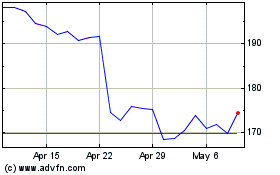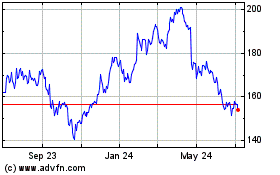NUCOR
Revenue Growth Disappoints
Nucor Corp. reported weaker-than-expected revenue growth its
third-quarter even amid steel price trends that have improved after
the U.S. government cracked down on low-price steel imports from
China, and projected a downbeat view for its fourth quarter.
Shares fell 4.7%, to $45.77 in morning trading.
The company said earnings in the fourth quarter are expected to
decrease "notably" compared with the third quarter because of lower
margins in the steel mills segment, with the most significant
impact being on the sheet mills. For the latest period, which ended
Oct. 1, average sales price per ton increased 11% from the second
quarter and increased 2% from the year-ago period.
Nucor has previously attributed higher steel prices in part to
inventory reductions and weaker levels of imports since the U.S.
Commerce Department's move to impose tariffs in response to a surge
of low-price steel imports, especially from China. But the company
has also said that since roughly half of its sheet steel shipments
are under contract, there will be a lag before the company gets the
full benefit of the improved pricing trends.
Nucor said earnings were helped in the third quarter because of
stronger performance in its steel mills and raw materials segments,
while market conditions for plate and bar mills remained pressured
by high levels of imports.
Overall, Nucor reported a profit of $270 million, or 84 cents a
share, up from $227.1 million, or 71 cents a share, a year earlier.
The company expected per-share earnings of 85 cents to 90
cents.
Sales rose 1.5%, to $4.29 billion, as analysts were expecting
4.51 billion, according to Thomson Reuters.
--Joshua Jamerson
PULTEGROUP
Housing Demand Remains Healthy
PulteGroup Inc. said earnings rose 19% in the third quarter amid
better-than-expected new order growth as demand in the U.S. housing
market remained solid.
However, the company missed its gross margin guidance and
doesn't see margins improving in 2017. Shares were down 4.2% at
$19.06 in morning trading.
The results come after the home builder last month resolved a
public dispute between management and the company's founder over
PulteGroup's future. Ryan Marshall was named chief executive,
replacing Richard J. Dugas Jr., who had been embroiled in a public
battle with PulteGroup founder William J. Pulte over the direction
of the company.
On Thursday's call, Mr. Marshall said he was happy the company
has "removed any uncertainties related to company leadership."
"Now we can focus conversations on talking about the business,"
he said.
After hedge fund Elliott Management Corp. took a stake in the
company earlier this year, executives also announced a plan to slow
the company's growth in future land spending. Mr. Marshall said
Thursday that he wants the company to continue bringing down its
inventory of land to meet goals of "generating higher returns while
managing our risk."
Based on the number of homes delivered, Mr. Marshall said the
company currently owns about 5.2 years worth of lots. He said in
the coming years he would like to get that number down to around
three years worth of owned lots.
For the quarter that ended in September, new orders at
PulteGroup grew by 17% to 4,775 homes. Analysts polled by FactSet
had expected new unit orders of 4,546.
Gross margin in the latest period was 21.1%, 10 basis points
below the company's guidance range, pressured by higher land and
labor costs, and labor rate inflation. On a conference call with
analysts, Chief Financial Officer Robert O'Shaughnessy said that
"assuming those conditions continue," the company decided to lower
its fourth-quarter margins guidance to a range of 20.5% to 21%. Mr.
O'Shaughnessy said he expects that the trend to continue into
2017.
Citing an improving economy and more demand from first-time
buyers, Mr. Marshall also said he expects the company to focus more
on that segment than earlier in the recovery. "As the economy and,
frankly, the housing-recovery cycle has continued to progress,
we're seeing strength from the first-time buyers, and thus
additional opportunities for us to put capital to work," he
said.
In September, rival home builders KB Home and Lennar Corp.
posted better-than-expected earnings amid gains in new orders.
Home-building in the U.S. fell in September after a rebound in
June. But builders received more permits, a sign that residential
construction should pick up in the coming months amid steady
demand.
Mr. Dugas left the CEO post in September but will remain
chairman through the company's annual meeting, expected to be held
in May 2017. He first said in April he would be retiring next year
amid pressure from Mr. Pulte, the company's largest shareholder.
But Mr. Pulte demanded Mr. Dugas's immediate resignation, arguing
in a series of letters that PulteGroup's stock performance and
sales volume have lagged behind rival home builders throughout the
housing recovery.
Overall, PulteGroup reported a profit of $128.5 million, or 37
cents a share, compared with $107.8 million, or 30 cents a share,
in the year-earlier period. The company said excluding certain
items, such as those associated with a contract settlement and
previously announced plans to reduce overhead expenses, the company
earned 43 cents a share. Analysts had expected 44 cents a share in
earnings, according to FactSet. Total revenue grew 29% to $1.94
billion, meeting expectations.
--Joshua Jamerson and Chris Kirkham
UNION PACIFIC
Commodities Slump Weighs on Earnings
Union Pacific Corp. said its third-quarter earnings fell 13% as
the railroad operator, like others, said it continued to be hit by
weak demand for commodities it transports.
The Omaha, Neb., company's shares, up 24% this year, fell 3.1%
to $94.12 in recent premarket trading as the results missed
expectations.
Union Pacific's total freight volume declined 5.8%, led by a 14%
drop in coal volume. Shipments in its intermodal business, which
moves freight using a combination of trains and trucks, declined
6.7% and industrial products volume dropped 11%. Agricultural
volume, which rose 11%, was the only exception.
Freight revenue dropped 7.2% on the weaker freight volume and
lower fuel surcharge revenue that offset benefits from higher
prices.
The weaker demand was partly offset by lower operating expenses,
which declined 4.2%.
In prepared remarks Thursday, Chief Executive Lance Fritz said
sectors such as grain and energy "are showing signs of life" though
challenges continue from the broader economy, a relatively strong
U.S. dollar and soft demand for consumer goods.
Overall, Union Pacific reported a profit of $1.13 billion, or
$1.36 a share, down from $1.3 billion, or $1.50 a share, a year
earlier. Revenue decreased 7% to $5.17 billion.
Analysts polled by Thomson Reuters expected per-share profit of
$1.40 and revenue of $5.18 billion.
Last week CSX Corp. reported weaker third-quarter results as
slumping coal shipments continued to pressure its results, though
cost-cutting efforts helped the company's performance beat
expectations.
On Tuesday, Kansas City Southern's third-quarter results also
declined as revenue was dented by weak freight volume, led by
declines in crude and frac sand shipments. The company said events
such flooding outages and service disruptions on its Mexican
network also resulted in additional operating costs.
Norfolk Southern Corp. is set to report on Oct. 26.
--Tess Stynes
(END) Dow Jones Newswires
October 21, 2016 02:48 ET (06:48 GMT)
Copyright (c) 2016 Dow Jones & Company, Inc.
Nucor (NYSE:NUE)
Historical Stock Chart
From Apr 2024 to May 2024

Nucor (NYSE:NUE)
Historical Stock Chart
From May 2023 to May 2024
